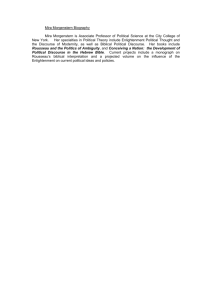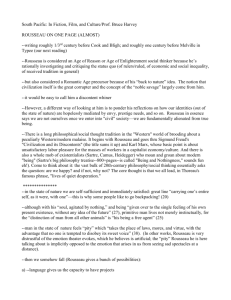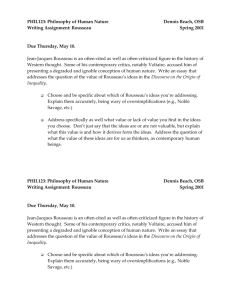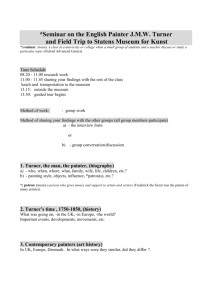ourida mostefai
advertisement
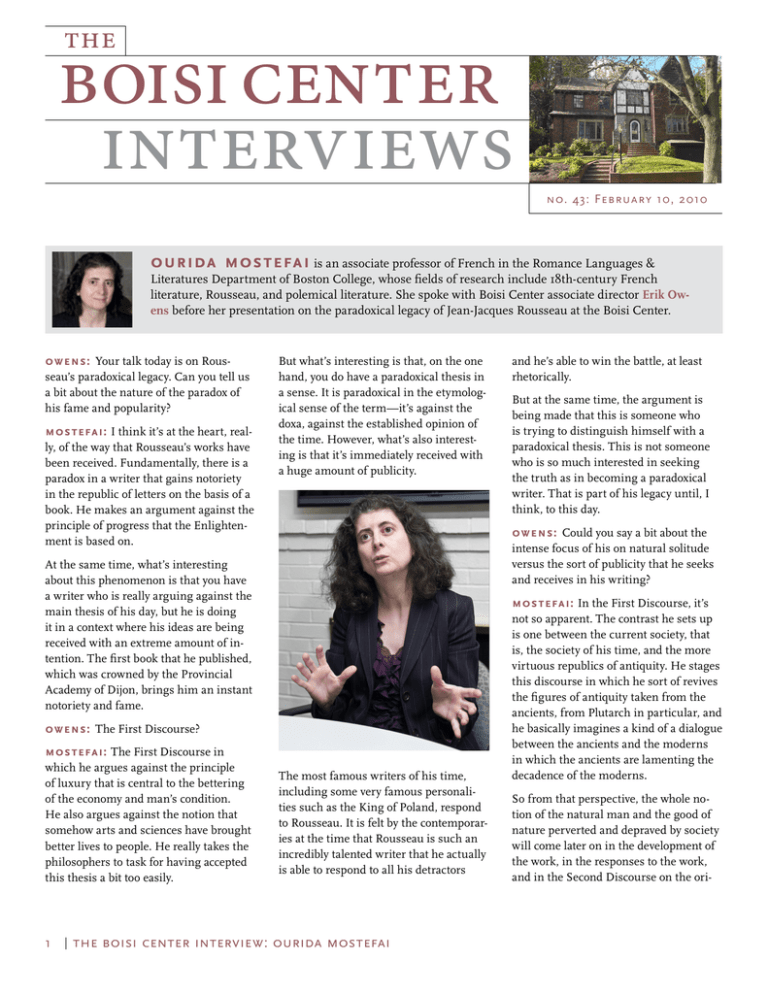
the boisi center interviews no. 43: February 10, 2010 ourida mostefai is an associate professor of French in the Romance Languages & Literatures Department of Boston College, whose fields of research include 18th-century French literature, Rousseau, and polemical literature. She spoke with Boisi Center associate director Erik Owens before her presentation on the paradoxical legacy of Jean-Jacques Rousseau at the Boisi Center. owens: Your talk today is on Rousseau’s paradoxical legacy. Can you tell us a bit about the nature of the paradox of his fame and popularity? mostefai: I think it’s at the heart, really, of the way that Rousseau’s works have been received. Fundamentally, there is a paradox in a writer that gains notoriety in the republic of letters on the basis of a book. He makes an argument against the principle of progress that the Enlightenment is based on. But what’s interesting is that, on the one hand, you do have a paradoxical thesis in a sense. It is paradoxical in the etymological sense of the term—it’s against the doxa, against the established opinion of the time. However, what’s also interesting is that it’s immediately received with a huge amount of publicity. intense focus of his on natural solitude versus the sort of publicity that he seeks and receives in his writing? mostefai: In the First Discourse, it’s owens: The First Discourse? 1 But at the same time, the argument is being made that this is someone who is trying to distinguish himself with a paradoxical thesis. This is not someone who is so much interested in seeking the truth as in becoming a paradoxical writer. That is part of his legacy until, I think, to this day. owens: Could you say a bit about the At the same time, what’s interesting about this phenomenon is that you have a writer who is really arguing against the main thesis of his day, but he is doing it in a context where his ideas are being received with an extreme amount of intention. The first book that he published, which was crowned by the Provincial Academy of Dijon, brings him an instant notoriety and fame. mostefai: The First Discourse in which he argues against the principle of luxury that is central to the bettering of the economy and man’s condition. He also argues against the notion that somehow arts and sciences have brought better lives to people. He really takes the philosophers to task for having accepted this thesis a bit too easily. and he’s able to win the battle, at least rhetorically. The most famous writers of his time, including some very famous personalities such as the King of Poland, respond to Rousseau. It is felt by the contemporaries at the time that Rousseau is such an incredibly talented writer that he actually is able to respond to all his detractors the boisi center interview: ourida mostefai not so apparent. The contrast he sets up is one between the current society, that is, the society of his time, and the more virtuous republics of antiquity. He stages this discourse in which he sort of revives the figures of antiquity taken from the ancients, from Plutarch in particular, and he basically imagines a kind of a dialogue between the ancients and the moderns in which the ancients are lamenting the decadence of the moderns. So from that perspective, the whole notion of the natural man and the good of nature perverted and depraved by society will come later on in the development of the work, in the responses to the work, and in the Second Discourse on the ori- gins of inequality. His fame comes from the First Discourse. owens: How do you see the movement between the First and Second Discourses and then to The Social Contract vis-à-vis his public life? mostefai: What’s interesting is that every single piece of writing from him will generate the same amount of attention and controversy. That includes of course the other parts of his publication that have to do with the arts, such as his opera, his play that he publishes at the time, and the various controversies and the disputes he takes part in regarding the superiority of Italian music over French music. What’s striking about the First Discourse is that normally no one reads an obscure discourse written for some provincial academy in Dijon. But in this particular case, the public that the discourse attracts goes well beyond what might have been expected of such a text written for a very specialized audience. Rousseau’s renown and his public persona that develops from that day go beyond what is normally expected of an academic piece even though that’s what it was, really—a rhetorical piece for a very limited public. owens: So how did he fit into the world in which he joined by becoming a celebrity, a man of letters? mostefai: I think he fits in very well on the one hand. On the other hand, he cuts an unusual figure. He fits in very well because, like his contemporaries, he’s extremely ambitious. He has scientific projects; for example, he’s interested in inventing a flying machine, and in that sense he is very much like his contemporaries. I think people tend to forget that a man of letters actually includes letters and sciences, so he’s interested in science, theater, music, and the arts. He will take part in the most ambitious enterprise of 2 its day, the famous Encyclopedia directed by Diderot and d’Alembert. So he is really part of that group. Nevertheless, because of the persona that he takes on and the attitude that he displays as a writer, he is sort of set apart from that group. Eventually, he will break with his former colleagues, the philosophes, and no longer participate in that. But that will be at a time when his own fame and his own writings have now acquired him a place of its own. owens: Some of his peers still were using nom de plume or anonymity in their writing. He seemed to reject that entirely “[Rousseau] is a writer with whom the notion of life and works becomes connec ted to him. He is staking his entire life and integrity on his works.” in a way that led him to focus on himself as well. What does that say about his perspective and on the sort of contrarian legacy that you’re speaking about here? mostefai: That’s a very important point, and it’s very central to the way that his contemporaries perceive him. By refusing to adopt this common practice of his time, he really transformed the relationship between himself and his public because otherwise the public would not have been ready to view him as the author of all of these separate works. the boisi center interview: ourida mostefai One of the problems that this creates for the public is to ask “How can you account for the fact that this is a man who publishes a discourse against arts and letters while also writing an opera for which he almost gets a royal pension (which he declined) and writing a play? Using his real name is actually the aggregation of all these separate works whereas, according to the old model, they could have been written by the same author but under different names. This creates a problem for him because he has to defend his own reputation. He has to defend himself against the charges of inconsistency, paradox, and contradiction. owens: Was his life lived in his writing or separate from his writing? mostefai: I argue that he is a writer with whom the notion of life and works becomes connected to him. Since he has claimed from the beginning that he is not just some regular author, he is staking his entire life and integrity on his works. He is now being asked to account for that, to account for the discrepancies, the contradictions, the paradoxes. No one can, from that point on, distinguish the life from the works. Every single piece written in reaction to his works brings up both. This obviously would not happen if he were publishing the works anonymously or if he were not making such a claim. owens: To conclude then, what is Rousseau’s legacy, not as a theorist of human anthropology or of human development or social contract, but as a writer in relationship to his writings with the paradox as an iconoclast? How do contemporaries today look back at Rousseau, both in the French context and here in the U.S.? mostefai: I think that the interesting aspect of his legacy is that we don’t realize how much we owe to Rousseau. A lot of what we take for granted about the modern and even contemporary persona of an author really originates with Rous- seau. For example, when you buy a book today, there’s always a blurb about the author. Rousseau is the one that begins this process. It will be of absolute importance for the following generations, especially the romantic generation, in the 19th century. They will no longer be able to have the same sort of experience of writing. Rousseau also becomes a model that is either espoused or rejected. Even today, it’s almost impossible not to have a position for or against Rousseau. In my work, I have people who tell me, how can you work on this author? It’s so abominable. People say, I read the Reveries, and I think it is a terrible book, and had to put it down. At the same time, there are people who have a completely different understanding of it. So I do think we have an example of a writer who introduces the persona of the author at the center of the works. You can no longer separate the two. For example, if you’re going to talk about Rousseau’s influence on the French Revolution, you have to realize that the reason people such as Robespierre, Kant and even Napoleon are interested in reading The Social Contract is not just because The Social Contract presents an interest- ing political theory. It’s because JeanJacques Rousseau wrote these books. That’s, I think, what the legacy is—the legacy of having introduced the persona of the author in the writing of the theoretical works. [end] The Boisi Center for Religion and American Public Life Boston College 2 4 Quinc y Road Chestnut Hill, MA 02 467 tel 617 - 55 2-1860 f a x 617 - 55 2-1863 publife@b c .e du Visit bc .e du/boisi-resources for a complete set of the Boisi Center Inter views and audio, video, photographs, and transcripts from our events. 3 the boisi center interview: ourida mostefai b oisicenter @b oisi _ center
